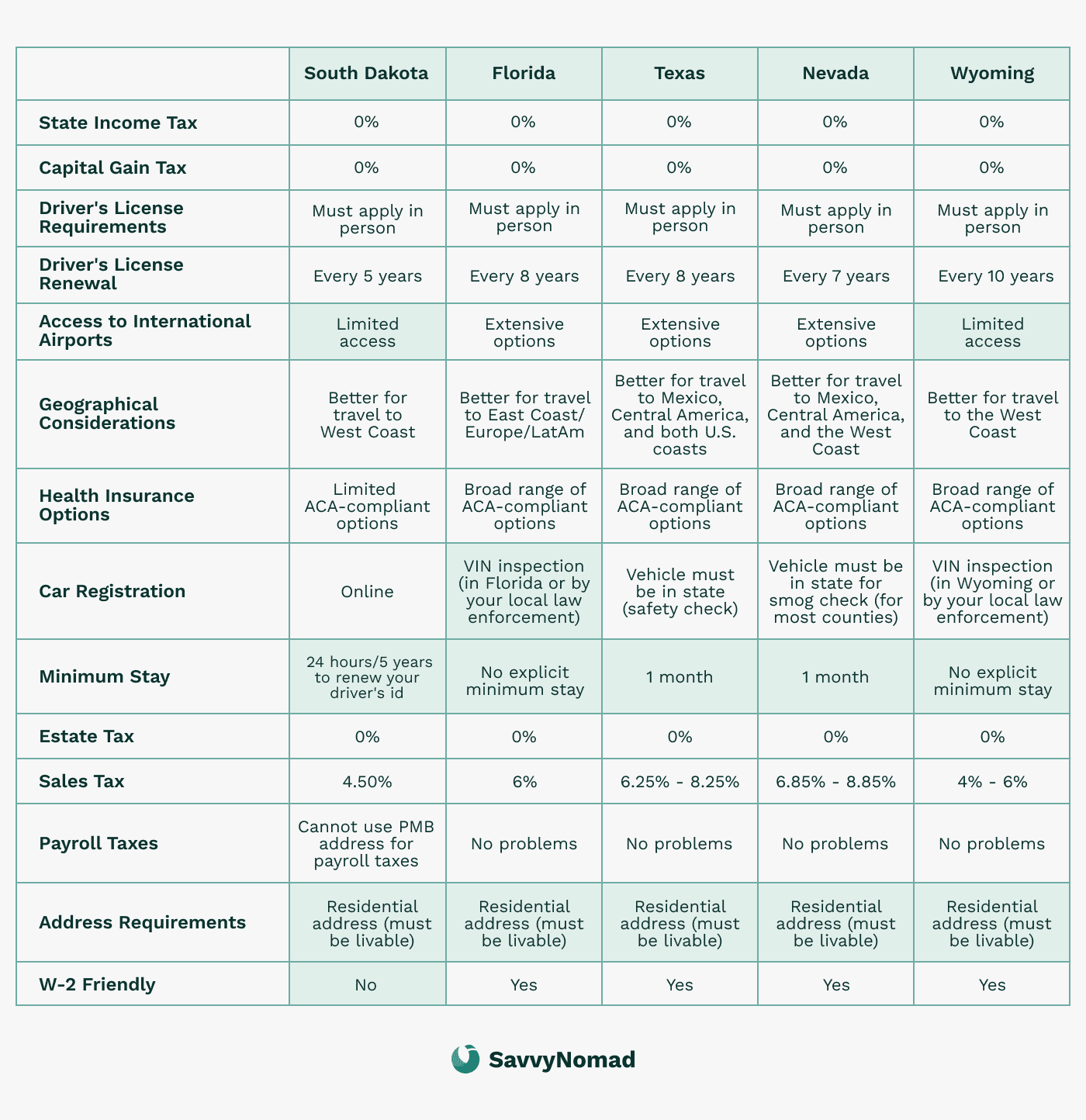How to leave New Mexico residency?

Leaving New Mexico residency involves specific rules that can affect your tax obligations and eligibility for state benefits. This guide will help you navigate the process of officially leaving New Mexico and establishing residency elsewhere while managing any remaining financial ties with the state.
Step 1: Establish a new domicile
After deciding to leave New Mexico, the next step is to establish your new permanent home, or domicile, in another state. Just moving isn't sufficient; you need to take specific steps to make your new state your official residence.
Here’s how to do that:
1) Establish new residency
- Secure a residential address: Find a place to live in your new state, whether it’s through renting or buying a home. Many states, like Florida, offer tax benefits such as the homestead exemption, which could help lower your property taxes. Setting up a permanent residence in your new state is essential to proving that you’ve left New Mexico.
This is especially useful for digital nomads and expats who want a Florida documentation footprint in a tax friendly state, while recognizing that the address itself does not guarantee any particular tax outcome or acceptance by every agency or institution.
- File a Declaration of Domicile: Some states, like Florida, allow you to file a Declaration of Domicile, a legal document that confirms your intent to make the new state your permanent home.
Residency guides:

2) Relocate your belongings
Moving your personal belongings—like furniture, vehicles, and household items—helps show that your move is permanent and that you intend to live in the new state long-term.
3) Spend time in your new state
Make sure you spend more time in your new state than in New Mexico to establish your primary residence.
4) Transfer IDs and vehicle registrations
Update your driver’s license and vehicle registration to reflect your new address in your new state. This is a strong indicator of your intent to live there permanently.
5) Register to vote (if eligible)
Register to vote in your new state, if you are eligible. Voter registration is a strong supporting indicator of residency, but it is considered together with many other factors and does not by itself determine your tax status. You should also cancel your voter registration in New Mexico and follow the guidance of the relevant election officials in both states.
6) Update financial accounts
Notify your bank, credit card companies, and other financial institutions of your new address. Keeping all your financial documents up to date with your new residency helps confirm your move.
7) Notify your employer
Let your employer know about your new address so they can update your payroll and tax withholdings for your new state. This helps prevent New Mexico state income taxes from being withheld after your move.

Step 2: Sever ties with New Mexico
After moving to your new home, it’s important to sever significant connections with New Mexico to prevent being considered a resident for tax purposes.
Here are the steps you should take to sever these ties:
1) Close New Mexico financial ties
- Close local bank accounts: If you have any bank accounts, investment accounts, or financial assets linked to New Mexico, consider closing them or transferring your funds to banks in your new state. This action shows that your financial life is now centered in your new state.
- Update personal records: Notify the IRS, Social Security, insurance companies, and other relevant agencies of your new address to help make sure all personal records reflect your new residence.
2) Sell or lease property
If you own a home or any other property in New Mexico, selling it is one of the strongest ways to show that you no longer consider New Mexico your primary residence. If you’re not ready to sell, consider leasing the property out for an extended period, as this can also help demonstrate your intent to leave.
3) Cancel local subscriptions/services
Make sure to cancel any subscriptions or memberships associated with New Mexico, such as gym memberships, utilities, or local services, as keeping these active could imply that you still have connections to the state.
4) Transfer healthcare and insurance
Transferring your healthcare providers and insurance to your new state shows that your essential services are now tied to your new domicile.

Step 3: Time spent outside New Mexico
To avoid being taxed as a resident in New Mexico, it is important to manage how much time you spend in the state and to end New Mexico domicile. New Mexico treats you as a resident if you are domiciled in the state for the full year or if you are physically present in New Mexico for 185 days or more in the tax year, even if your domicile is elsewhere.
183-day rule
- What is the 183-day rule?: If you are physically present in New Mexico for a total of 185 days or more in a calendar year, counted as full 24 hour days in the state, you are treated as a New Mexico resident for that year regardless of where your domicile is. This means you can be liable for state income taxes on your worldwide income.
- Stay under the 183-day limit: To avoid being taxed as a resident under the physical presence test, you will want to make sure you spend fewer than 185 full days in New Mexico each year. New Mexico counts a day only when you are in the state for a full 24 hours, but you should still track all visits carefully.
Keep detailed travel records
- Why it’s important: If your residency status is ever questioned, having detailed records of your time spent in and out of New Mexico will be essential for proving that you’ve stayed under the 183-day limit.
- What to track: Save flight tickets, hotel receipts, and any other travel documents that show when you entered and left New Mexico. Having a detailed log of your movements will be helpful if New Mexico’s Department of Revenue ever audits your residency status.
Step 4: New Mexico-sourced income
Even after you have officially ended your residency in New Mexico, you may still have some income connected to the state, such as rental income or business revenue. It's important to understand how to manage income sourced from New Mexico in order to stay compliant with state tax laws.
Here’s how to handle New Mexico-sourced income once you’ve moved:
1) Ongoing tax responsibilities
- File non-resident tax returns: If you continue to earn income from sources within New Mexico, such as rental properties or businesses, you will need to file non resident tax returns. These returns are structured so that New Mexico taxes only the income you earned within the state, while income from outside New Mexico is handled under your new state and federal rules.
- Tax on New Mexico-sourced income: Even though you are no longer a resident, New Mexico still has the right to tax income generated within the state. This could include wages earned in New Mexico, rental income, or profits from New Mexico-based businesses.
2) Rental or business income
If you own rental property or a business in New Mexico, any income generated from those sources will still be subject to New Mexico state taxes. It’s important to consult with a tax professional to ensure compliance with New Mexico tax laws, especially if you have complex income streams that tie back to the state.





